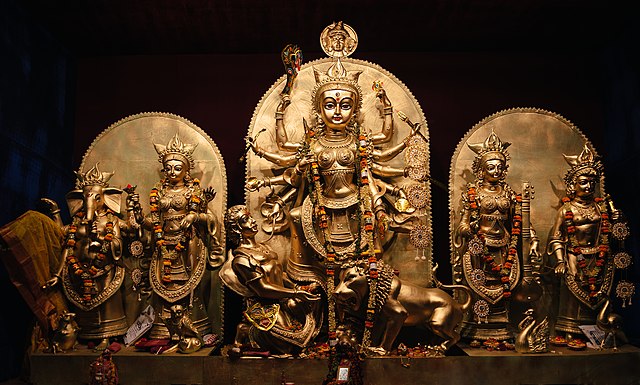Vayu, also known as Vata and Pavana, is the Hindu god of the winds as well as the divine messenger of the gods. In the Vedic scriptures, Vayu is an important deity and is closely associated with Indra, the king of gods. He is mentioned to be born from the breath of Supreme Being Vishvapurusha and also the first one to drink Soma. The Upanishads praise him as Prana or 'life breath of the world'. In the later Hindu scriptures, he is described as a dikpala, who looks over the north-west direction. The Hindu epics describe him as the father of the god Hanuman and Bhima.
Vayu (dikpala), on his mount, gazelle
Kushan ruler Kanishka I with deity Oado (Vayu-Vata) on the reverse. Circa 120-150 CE
Vayu sculpture, Gokarneshwor Mahadev Temple, Gokarna, Kathmandu
Hindu deities are the gods and goddesses in Hinduism. Deities in Hinduism are as diverse as its traditions, and a Hindu can choose to be polytheistic, pantheistic, monotheistic, monistic, even agnostic, atheistic, or humanist. The terms and epithets for deities within the diverse traditions of Hinduism vary, and include Deva, Devi, Ishvara, Ishvari, Bhagavān and Bhagavati.
Goddess Durga and a pantheon of other gods and goddesses being worshipped during Durga Puja Festival in Kolkata.
Six Hinduism deities. Surya, Parvati, Hanuman, Lakshmi, Vishnu, and Indra. All of these statues came from India, except Vishnu (from the Thai-Cambodian border). Various eras. National Museum of Scotland, Edinburgh
Shiva (left), Vishnu (middle), and Brahma (right)
The ten avatars of Vishnu, (Clockwise, from top left) Matsya, Kurma, Varaha, Vamana, Krishna, Kalki, Buddha, Parshurama, Rama and Narasimha, (in centre) Radha and Krishna. Painting currently in Victoria and Albert Museum.






